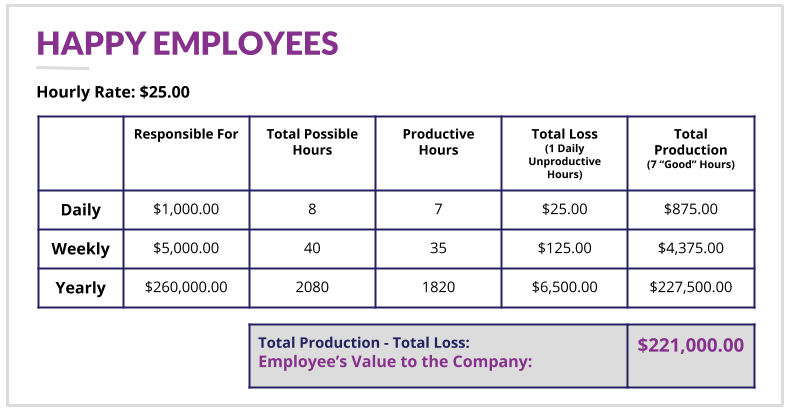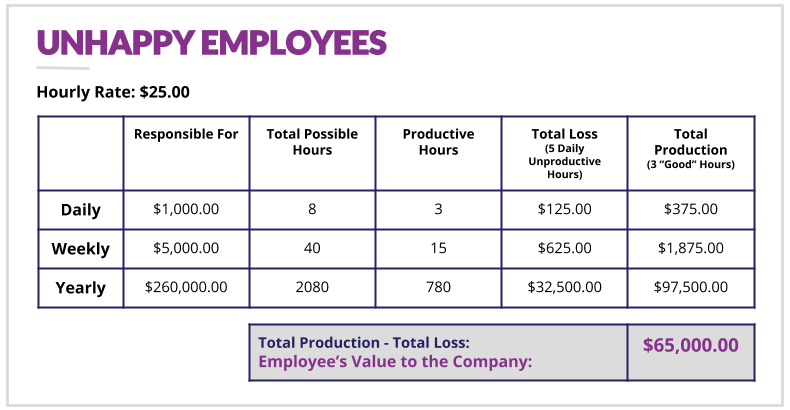There has been an unusual trend in the business world today, and something isn’t quite adding up. More than two-thirds of all employees are disengaged. If employees are disengaged, that means losing money. So, it makes you wonder if we truly manage people with the same care and devotion we use to manage our money. At first, it sounds like a silly premise. Surely, managing human beings is more important than managing money, right? However, when we examine all the available employment surveys and statistics, there is a troubling trend – not one recent study indicates an overall trend of happiness and satisfaction among most employees. That means turnover, struggles with productivity, even loss of profit. It follows that attracting, nurturing and maintaining top talent should be a huge focus for any business.
Nurturing engaged, productive employees is just as important as reaching financial goals, because your human capital is even more valuable than your monetary capital.
As a business owner, CEO, or HR Professional, you know an organization's scarcest and most valuable resource is its human capital (or human treasure, as we like to call it here at XQ). For example, let’s think of the concept of time – we all have the same amount of it, and its finite. Therefore, the collective time our staff spends on various activities become incredibly precious and valuable. To look at this another way, our employee’s time is almost certainly the most expensive line item on the profit and loss report.
In today's business climate, great talent is more scarce (and more expensive) than investment capital. Are you investing wisely?
Imagine, with the same amount of time in a day, your competitor gets far more out of their employees than you do. Let that sink in for one moment. If their employees outperform yours 2 to 1, what is happening to their top-line revenue against yours? What would it mean to you if your employees were only 10% more productive? What about 20%? What kind of tangible effects would you feel if this increase in production were to take place? In our experience, many business leaders understand this concept and recognize how important it is. The trouble comes when they ask, “What do I do about it?” Maybe it's time to consider investing in our people with the same care we invest our money. Here are 3 tips on how that can be achieved:
Use the Best Data - The Awareness Pyramid
One of the models we use for understanding our human capital is called the awareness pyramid. The bottom of the pyramid starts with the most basic and essential ingredient for happiness and productivity – self-awareness. Next, we look at group awareness – this might be a department or a division we work within. Lastly, we look at corporate awareness – how well do we know ourselves, our group, and our overall company?
Many professionals ask, “What is our culture?” XQ can help.
For the last decade, we’ve been using psychometric assessments with both our clients and our own internal staff to understand these deeper concepts. Thanks to technology and the improvements in neuroscience and brain imaging, we’re able to get incredibly accurate, unbiased, and non-judgmental data that helps us understand what makes people tick.
The information we gather from employee assessments help us to create an objective inventory of the various behaviors, skills, motivators, emotional intelligence, and much more. We sometimes jokingly refer to this as “people inventory”, but in truth this information allows us to truly appreciate the various talents of each individual, and helps us create strategic alignment between all levels of the organization. Most of us would not make a financial investment without knowing as much information as possible, and it should be no different for people. The more we know, the more we can appreciate and understand what people want.
Appreciate the Value of Time
Many XQ clients are shocked when we show them the true cost of unproductive time. I will often ask, “If your whole company simply wasted 1 hour today, what would that mean to you?” Most scratch their heads, some turn red in the face, and others sit silently when the weight of that question hits them. Too often, we simply don’t appreciate just how important every hour of the day is. Let’s use a very rudimentary example relating human capital to monetary capital:
HAPPY EMPLOYEE: comes to work with focus and energy. Is committed to their personal and company goals, and has a psychological contract with their employer. Through their diligence and hard work, on an average, they are productive for 7 of their 8 hours per day.
For the sake of this example, let’s assume they make $25 per hour. In an 8-hour work day, the employee is expected to produce about $1000 worth of productivity.

.png?width=355&name=XQ%20Happy%20Employees%20Chart%20(mobile).png)
UNHAPPY EMPLOYEE: dreads coming to work, and can’t stand their boss, and doesn't feel very motivated to contribute. Feels mistreated, under-appreciated, or unheard. They may also be dealing with acute anxiety and stress, further impacting their performance. In this all-too-common scenario, the employee is productive for only 3 of their 8 hours per day.
For the sake of this example, let’s assume they make $25 per hour, just like the happy employee in the previous example. In an 8-hour work day, the employee is expected to produce about $1000 worth of productivity.

.png?width=355&name=XQ%20Unhappy%20Employees%20Chart%20(mobile).png)
You’re telling me a happy employee can outperform an unhappy employee 3 to 1? All it takes is examining hours in a day, and it becomes crystal clear just how much of an impact employee engagement can have.
Across the world today, this example plays out over and over again. Frustrated by poor results, employers will simply hire another person to get the work done – now you’re paying two people for one person’s job. Alternatively, some employers will create a “churn and burn” effect, by having a revolving door of new hires constantly coming in to compensate for poor performance. You may never look at employee engagement the same way again – and that’s a good thing. The very best companies who continually outperform their competitors have this unique advantage – people care about what they’re collectively trying to achieve, and don’t waste time.
Deploying Capital vs. Deploying Talent
When investing, we often look at how to gain the best rate of return and will often consider multiple opportunities to get the desired outcome we’re looking for. No one would knowingly place their money somewhere if they thought the desired outcome would not match their stated goals. Should the way we treat our people be any different?
Within any organization there can be so many roles and functions that are required to get things done. Each of these requires a certain set of behaviors that produce the most excellent results. Once the right behavior is identified, many other factors pay a role: emotional intelligence, stress factors, acumen, soft skills, and what motivates us, just to name a few. A good financial analyst will go through all the factors that lead to desired outcomes. Likewise, a good Chief People Officer or people-based organization will take the time to measure understand all the aforementioned factors for their people.
We’ve already talked about employee assessments, and they definitely play a huge role here. Before using any assessment a good CPO knows that they must be accurate, scientifically validated, and non-judgmental. In the information age data has become the most valuable currency in the world, and people are the most valuable assets in the world. Therefore, it stands to reason that we should have the best possible data on our people in order to lead and manage them to mutually beneficial outcomes.
Next time you’re doing intense research and hard work to understand how to acquire or invest your money, ask yourself, “am I trying this hard to understand people?” You might just help your organization become one of the lucky few who get maximum performance from their teams.
